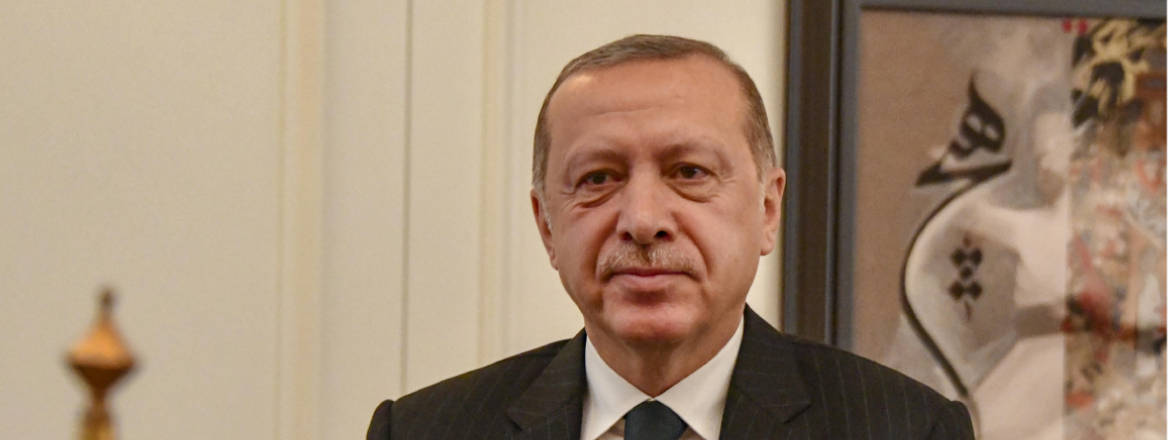The Worm is in the Fruit: A Rising Strategic Foe Inside NATO
What is the added value of a 70-year-old politico-military alliance when some of its members no longer share the same values and, more importantly, when the behaviour of one member – Turkey – collides with the security interests of the rest?
The recent naval incident in the Mediterranean between French and Turkish warships is another dramatic development in an already deteriorated situation involving a neo-Ottoman Turkey with growing geopolitical ambitions colliding with the core security interests of many European countries.
On 10 June, the merchant vessel Cirkin – sailing under the Tanzanian flag, escorted by Turkish warships and suspected of smuggling weapons into Libya in contravention of the UN Security Council Resolution 2473, imposing an arms embargo on all the protagonists in the Libyan war – was challenged by the French frigate Courbet, which was taking part in NATO’s Operation Sea Guardian, whose task is to work with the Mediterranean to maintain maritime situational awareness, as well as deter and counter terrorism. Earlier in the day, an unsuccessful challenge attempt on the Cirkin had been made by a Greek frigate. This frigate was part of the EU’s Operation Irini, whose purpose is to implement the UN-mandated arms embargo.
In reaction to the Courbet getting closer to the Cirkin, the Turkish warships flashed their fire-control radars with crews putting on bulletproof vests and standing behind their light weapons. Even by the standards of Cold War confrontations between Western navies and the then Soviet Navy’s so-called Mediterranean Eskadra, the Turkish Navy’s behaviour was extremely aggressive.
Immediately thereafter, France requested a NATO Council meeting to discuss the incident and asked for an official inquiry by the Alliance. Interestingly, whereas 10 NATO members supported France’s demand (Belgium, Germany, Greece, Italy, Luxembourg, Portugal, Slovakia, Slovenia, Spain and the UK), none of the Alliance’s eastern flank (Slovakia excepted) or Nordic members did.
The perspective of Turkey relenting on its longstanding opposition to approving NATO’s defence plans for Poland and the Baltic states may have played a role in those countries’ official silence, yet none of these considerations apply to the US’s astounding silence. It is notable, however, that all of NATO’s European Mediterranean countries (except Croatia and Albania) supported France’s request.
France also suspended its participation in Sea Guardian and asked for the Alliance to collectively adopt some measures, including:
- An official reaffirmation by NATO of the respect of the embargo.
- A clear rejection of the use of NATO call signs by Turkish ships if/when they do not comply with UNSCR 2473.
- Reinforced cooperation between NATO and the EU in the Eastern Mediterranean.
- The establishment of deconfliction procedures at sea.
Long-Term Implications
No one should underestimate the seriousness of the tactical standoff that occurred on 10 June, with its risks of escalation. But the growing strategic divide between NATO members that these events underline is even more concerning for the future of the Alliance.
The situation in 2020 can hardly be compared to the one of 1974, a year which saw Ankara invading the northern part of Cyprus and tensions with Greece spiralling dangerously. At that time, the lethal threat emanating from the Soviet Union was still providing the glue which bound the Allies together. Since then, however, circumstances have dramatically changed: a disastrous Trump presidency has hurt the credibility of the US as a guarantor of decent behaviour within the organisation, and has raised doubts about Washington’s commitment to action in the event of an attack against a NATO member. And notwithstanding NATO summit declarations and Moscow’s rogue international behaviour, it is a fact that the Russian threat is no longer perceived with similar intensity by all NATO members.
One NATO summit after another, the relevance of NATO’s added value on its southern flank is regularly questioned. Even though a paragraph of each official communiqué always religiously includes a nod to the issue by evoking NATO’s ‘360-degree approach to security’, the reality is that the slogan still lacks significant substance when one looks at NATO’s concrete added value in facing some important risks on its southern flank. Among the three core tasks of the 2010 Strategic Concept – collective defence, crisis management and cooperative security – crisis management is the weaker link, which in turn makes the common denominator of strategic interests more tenuous.
Today, through his active military involvement in support of one of Libya’s belligerents and its Islamist proxies, and through his contempt of a UNSCR, Turkey’s authoritarian leader Recep Tayyip Erdoğan is feeding the image of a resurgent imperialist country whose agenda directly impinges on European security interests.
Last month’s incident only adds to an already long list of unfriendly if not provocative Turkish actions, which include the acquisition of the sophisticated S-400 Russian anti-air system, the recurrent threat to terminate the €6 billion subsidy agreement with the EU and to open the Turkey’s borders to millions of Middle Eastern refugees towards Europe, as well as the January 2019 military attack against our Kurdish allies in northern Syria – our best and more effective partners in the fight against the Islamic State – after the inexplicable ‘green light’ given by Donald Trump without any previous collective consultation among the Allies.
To this egregious behaviour, one should also add: the 2018 harassment by the Turkish Navy of ENI and Total oil and gas exploration ships in the exclusive economic zone (EEZ) of the Republic of Cyprus; the subsequent deployment of a Turkish research vessel in the same Cypriot waters in 2019; the Turkish claims on Gavdos, a Greek island free of any Turkish ‘heritage’, only for the purpose of vastly extending the Turkish EEZ in the south of Crete; and the recent and legally baseless agreement concluded with the political authorities in the Libyan capital of Tripoli which would result in ‘sharing’ almost the entire Eastern Mediterranean between the two countries.
To be clear, a resurgence of terrorist entities in northern Syria and a reinforcement of the most radical factions in Libya through the recent export by Ankara of thousands of Syrian Islamist mercenaries would constitute worrisome scenarios for Paris and most other European capitals. Indeed, this would carry the risk of spreading more instability in the Sahel region.
All this adds acrimony to the obvious divergence on values between Turkey and the rest of Europe. Erdogan’s attacks on Turkish democratic institutions are of another magnitude than the already worrisome trends that we can observe in a few Eastern European democracies. Journalists, judges and lawyers are prosecuted and jailed, while hundreds of Turkish officers who have served within NATO commands have been purged from the military and jailed in many cases.
So, what kind of message does Erdoğan's Turkey want to pass to NATO? And what is the critical breaking point when the interests of having Turkey inside NATO are superceded by the blows which it inflicts on Europe’s geopolitical interests? The answer to this won’t be identical in every European country, but that in itself puts NATO at risk.
If NATO membership would result in effectively shielding Turkey’s threatening actions in the Middle East, the Mediterranean and North Africa from any concrete consequences, this would be seen as less and less acceptable by the government in Paris. And that is the true subtext of what France’s authorities are saying in Brussels.
It would be a mistake to underestimate the magnitude of France’s frustration. Nor should it be forgotten that France ranks as the third contributor to NATO’s common budget and, above all, is considered by many analysts as the second most militarily credible member of the Alliance.
The views expressed in this Commentary are the author’s, and do not represent those of RUSI or any other institution.
WRITTEN BY
Vice Admiral Patrick Chevallereau
RUSI Distinguished Fellow, Military Sciences


